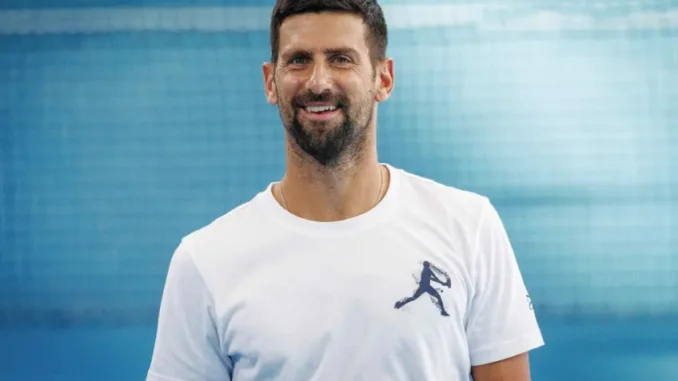
Novak Djokovic, one of the most successful and polarizing figures in tennis, has often been at the center of the vaccination debate. His stance on the COVID-19 vaccine, which led to his high-profile deportation from Australia in 2022 and barred him from participating in several major tournaments, sparked worldwide discussion about individual choice, public health, and sports regulations. Recently, Djokovic addressed the subject again, offering a candid update on his position and shedding light on whether his views have evolved over time.
Djokovic, who has always been outspoken about his personal beliefs, reaffirmed his respect for individual freedom of choice. In his latest comments, he remained consistent with his earlier statements, emphasizing that his decision regarding vaccination has always been rooted in his values and understanding of health. “I’ve always been honest about my stance on this issue, and that hasn’t changed,” Djokovic stated. “I respect everyone’s choice, and I’ve made mine based on what I feel is best for my body and my principles.”
For many, Djokovic’s steadfastness is a reflection of his deeply held convictions. Throughout his career, the Serbian superstar has adhered to a disciplined lifestyle, prioritizing physical and mental well-being. His choices often extend beyond conventional norms, such as his gluten-free diet and focus on holistic practices. It is within this framework that Djokovic’s decision not to get vaccinated against COVID-19 should be understood—part of a broader philosophy centered on personal autonomy and tailored health practices.
The controversy surrounding Djokovic’s vaccination status reached a boiling point during the Australian Open in 2022. His initial arrival in Melbourne, accompanied by a medical exemption from vaccination requirements, led to a media frenzy and widespread public backlash. Ultimately, the Australian government revoked his visa, and Djokovic was deported just days before the tournament began. The incident underscored the tensions between individual rights and public health policies, with Djokovic caught in the crossfire.
In his recent remarks, Djokovic reflected on the consequences of that experience and others like it. “It wasn’t easy, being unable to compete and having my name associated with such a divisive issue,” he admitted. “But I stand by my principles. For me, competing has always been about more than winning—it’s about staying true to myself.”
The fallout from Djokovic’s stance didn’t end in Australia. He was later unable to participate in several events in the United States, including the prestigious Indian Wells and Miami Open tournaments, due to the country’s vaccine requirements at the time. Despite these setbacks, Djokovic’s on-court performance remained stellar whenever he was able to compete. His ability to maintain focus and deliver results under immense scrutiny has only cemented his status as one of the greatest players of all time.
While Djokovic’s firm position has earned him admiration from those who champion personal freedom, it has also drawn criticism from others who believe high-profile athletes have a responsibility to set an example, particularly in matters of public health. Critics argue that his refusal to vaccinate could influence fans and followers, potentially undermining global vaccination efforts. Djokovic, however, has consistently rejected the notion that his personal choices should dictate others’ decisions. “I never claimed to represent anyone but myself,” he said. “People should make their own decisions based on their circumstances and beliefs.”
As the world gradually moves into a post-pandemic phase, with many restrictions lifted and vaccination no longer a prerequisite for most international travel, Djokovic’s stance on the issue has become less of a barrier to his participation in tournaments. Nevertheless, questions about whether his opinion has shifted persist. His recent comments make it clear that, while he is open to discussion and respects differing viewpoints, his personal position remains unchanged.
“I’ve learned a lot over the past few years, not just about the virus and vaccines but about how quickly debates like these can polarize society,” Djokovic said. “It’s taught me the importance of empathy and understanding. Everyone is doing what they think is right, and we need to respect that.”
Despite the divisive nature of the vaccination debate, Djokovic’s resilience in the face of controversy has been nothing short of remarkable. Throughout the ordeal, he has remained a dominant force in tennis, claiming several Grand Slam titles and breaking records even as questions about his off-court choices loomed large. His victories on the court serve as a testament to his ability to compartmentalize personal challenges and professional performance.
As Djokovic continues to navigate his career, he seems focused on broader goals that transcend the vaccine debate. At 36 years old, he is not only chasing more Grand Slam titles but also working to cement his legacy as a global ambassador for the sport. Through his foundation, he is deeply involved in initiatives to support education and early childhood development, particularly in Serbia and other underprivileged regions. These efforts showcase a side of Djokovic that is often overshadowed by controversies—his commitment to making a positive impact beyond the tennis court.
For many fans, Djokovic’s honesty about his views is a key part of his appeal. Whether one agrees with his stance or not, there is no denying his willingness to stand firm in his beliefs, even when it comes at great personal and professional cost. His journey is a reminder of the complexities athletes face in the modern era, where their decisions often carry weight far beyond the boundaries of their sport.
As the 2025 season unfolds, Djokovic’s focus will likely shift back to his primary passion: tennis. With fewer restrictions in place and a renewed opportunity to compete in tournaments worldwide, he is poised to continue his quest for excellence. While the vaccination debate may remain a part of his story, it is clear that Djokovic’s legacy will ultimately be defined by his achievements, resilience, and unwavering commitment to his principles.
Leave a Reply